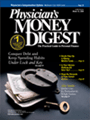Take a Look at Health Savings Accounts
With health insurance premiumson the rise, there's a provisionin the new Medicare law thatcomes along in the nick of time. The lawallows consumers to open Health SavingsAccounts (HSAs), which are a tax-deductibleway to save for medicalexpenses, and you don't have to be age 65to take advantage of them.
HSAs are accounts that are tied to high-deductiblehealth insurance policies. UnderUS Treasury Department rules, you are eligibleto put money into an HSA if yourhealth insurance policy imposes a deductibleof at least $1000 for singles or$2000 for a family. The policy must alsohave an out-of-pocket cap of at least $5000for individuals and $10,000 for families. Ifyou're under age 65 and otherwise eligible,you can put up to $2600 into an HSAthis year if you're single and $5150 if youhave a family policy. You can also put in anextra $500 if you will reach age 55 this year.
There can be big tax advantages to anHSA. Like money you put in an IRA or a401(k) plan, cash you put in an HSA is inpretax dollars, which means it doesn'tcount as income when April 15 rollsaround. Unlike money you take out ofyour retirement plan, however, any cashyou withdraw from your HSA is still nottaxed, as long as you use it to pay qualifiedmedical expenses.
Tax-Free Attraction
The cash you put into an HSA can beinvested in mutual funds or stocks, and anygains are tax-free. Unlike flexible spendingaccounts that some employers offer, youdon't need to clean out the account by theend of the year or lose it. An HSA lets youroll over any assets in the account fromyear to year. If you switch jobs or leave youremployer, you can carry your HSA withyou. Upon your death, the assets in yourHSA can be passed to your spouse tax-freeand they can make tax-free withdrawalsfor medical expenses.
HSAs figure to be most attractive toconsumers who are self-employed or workfor small businesses that don't offer healthinsurance coverage to their employees.Those who work for larger companies,which are more apt to provide theiremployees with broader coverage, are lesslikely to be lured by the tax breaks that anHSA offers. In fact, number crunchers havefigured out that a family of four with ahousehold income of less than $26,425would see no tax benefits at all.
Additional Downsides
There are other drawbacks to an HSA.Putting money in an HSA is essentially awager with the insurance company thatyou won't need it to pay for a majormedical expense in the near future. Afamily with a policy that has a $10,000out-of-pocket cap, for example, wouldneed at least 2 years' worth of maximumcontributions before their HSA accountassets would reach that level.
Although money you take out of anHSA for medical expenses is tax-free,you should remember that if you withdrawcash for any other reason beforeyou reach age 65, you'll pay a penaltyplus income taxes of up to 35% on thewithdrawal. After age 65, the penaltydisappears, but you'll still have to paythe tax.
